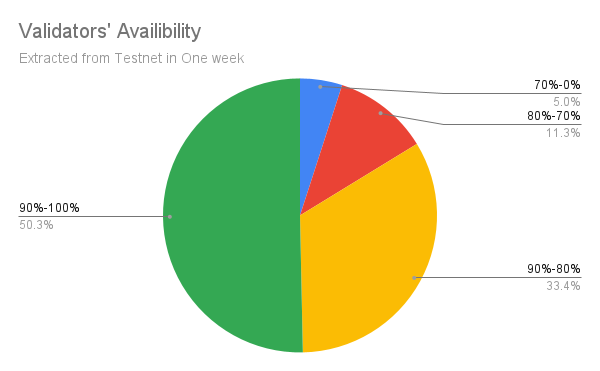PIP-19: Availability Score for Validators
| Authors | B00f (@b00f) |
|---|---|
| Discussion | View Discussion PIP-19 |
| Category | Core |
| Created | 01-01-2024 |
Table of Contents
Abstract #
This proposal suggests the introduction of an Availability Score for validators in the Pactus network to enhance network stability.
Motivation #
Some users are running Pactus on extremely low-spec machines, potentially compromising the stability of the blockchain. For example, at the time of writing this proposal, only 50% of validators have signed more than 90% of blocks in a one-week period. Considering that validators have a 10-second window to validate the block and broadcast their votes, this level of performance is suboptimal Therefore, we need to take action to discourage users from dedicating very low-spec machines to run Pactus.
The chart below is extracted from the Testnet data over a one-week period:

This proposal recommends implementing an Availability Score System that evaluates validators based on their performance within the committee.
Specification #
Availability Score Calculation #
Each validator gives a score to other validators called the “Availability score.” To calculate this score, we look at the last 60,000 blocks, which covers almost a week (each block taking 10 seconds).
To calculate the score, we look at how many blocks a validator signed compared to how many times they were in the committee:
\[S_i = \frac{V_i}{N_i}\]In this formula:
- $S_i$ is the score for validator $i$.
- $V_i$ is how many blocks validator $i$ signed.
- $N_i$ is how many times validator $i$ was in the committee.
The score is a number between 0 and 1. If a validator wasn’t in the committee for the last 60,000 blocks, their score defaults to 1.
Penalties #
When a validator within the committee receives a proposal from another validator, it first checks the availability score of the proposer. If the availability score is less than $0.9$, it rejects the proposal and enters the proposer-change phase 1. Since the majority of validators make the same decision, the proposal will be rejected, and the validator won’t receive any reward.
References #
Copyright
Copyright and related rights waived via CC0.